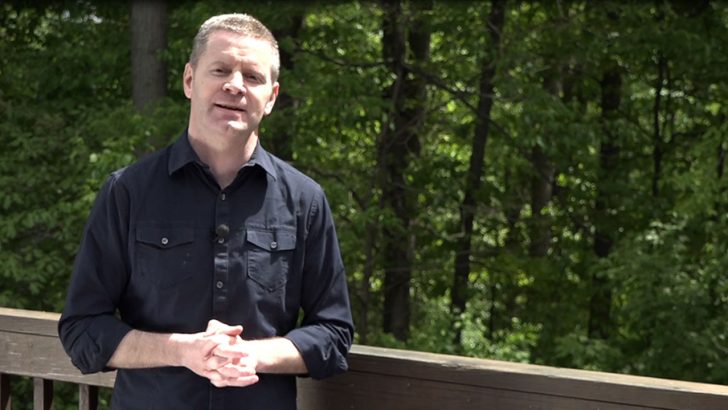“Everybody’s got a hungry heart,” says Christopher West, quoting Bruce Springsteen and observing in an echo of St Augustine’s opening observation from the start of his Confessions that “we all have a deep ache and hunger in our hearts for something”.
All set for a speaking tour of Ireland early next month, West, the best-known populariser of St John Paul’s Theology of the Body, has been lecturing on the subject since the 1990s, in 2004 helping to found Philadelphia’s Theology of the Body Institute where he serves as Senior Lecturer of Theology of Christian Anthropology.
“Here’s what’s going on,” he says. “Most people think that when it comes to this hunger of our heart, most people think Christianity is a starvation diet. We’ve heard the rules and the basic message of the starvation diet is ‘your desires are bad, they’re only going to get you in trouble, you need to repress all that, but follow all these rules and you’ll be a good, upstanding Christian citizen’.”
Desires
This approach to Christianity was ultimately responsible for the sexual revolution, he explains.
“See, this idea of a repressive Christianity, this idea of a stoic Christianity, this idea of just repressing all your desires and following the rules: this is why the sexual revolution happened,” he says, continuing, “the sexual revolution is understandable as a response to that repressive approach.”
Likening the sexual revolution to starving people being offered a diet of fast food, he says: “Here we are, 50, 60 years out from the sexual revolution – are we sexually liberated or are we sexually addicted? The true sexual revolution has yet to happen, and it’s the gift that John Paul II has given us in his Theology of the Body.”
The Theology of the Body was delivered over 129 Wednesday audiences between 1979 and 1984, though the project’s genesis began some years earlier.
“He started writing this in 1974,” West says. “It was a completed work before he became Pope. In fact, he completed it between the election of John Paul I and his own election. It was written as a book, and the intended audience was basically Poland, and wherever he could get it out beyond there as the Archbishop of Krakow. And then all of a sudden, right at the time he completed this work – this is fascinating – he was elected Pope. And he took this work and made it the first major teaching project of his pontificate.”
West’s interest in the subject dates back to his college years, when, haunted by having witnessed a date rape in a college dorm, he found himself dwelling on what was going on in his own life and in Western culture in general. “What is it in us as human beings,” he wondered, “that can lead us to treat other human beings as nothing but objects for our selfish pleasure?”
Searching for answers, he eventually came across the then Pope’s Theology of the Body. “What I discovered here is that Christianity is not a starvation diet,” he says, continuing, “it’s an invitation to a feast – to a wedding feast – that really corresponds to the deep hungers of our hearts.”
In the saint’s reading of human sexuality, sexual love within marriage is an icon of God’s own interior life, a sacramental experience that can teach us about God and humanity. In that interpretation, West, explains, sexual desire – or ‘eros’ has a vital role.
“Here’s what I learned from John Paul II – this is my metaphor, but it’s his teaching. God gave us eros to be like the fuel of a rocket that has the power to launch us to the stars,” he says, continuing, “the tragedy is that with original sin, those rocket engines became inverted, and this is why we go out into life seeking love, seeking happiness, and so often it backfires on us, because the rocket engines are pointed in the wrong direction.”
However, he says, this is not a tragic story – because the Gospel, after all, is good news.
“Christ comes into the world not to condemn those with inverted rocket engines, but to redirect our rocket engines to the stars. That’s what Theology of the Body is all about,” he says, “this is not a message of condemnation. This is not a message of sexual repression. This is not a message of just following the rules.”
On the contrary, he says. “This is a message inviting us all to rediscover the splendour, the beauty, the glory of what it means that God made us male and female, and gave us that atomic energy of our soul called eros.”
This desire, this energy, he says, is meant to lead us to our infinite destiny of life-giving love, such that if we aim our infinite yearnings for finite pleasures, it’s of course never going to satisfy.
“I like to say we have three choices with eros: we’re either going to become a stoic, an addict or an aspiring mystic,” he says, arguing that miss the mark if we repress our desires – most likely out of fear – or indulge them in finite pleasures, constantly seeking more, though he says it’s interesting that St Augustine observed those who are lost in their passions are less lost than those who have lost their passions.
“But the life of an aspiring mystic, and we’re all called to be aspiring mystics – in this sense a mystic is someone who’s opening his yearning for the infinite to the infinite – is the Christian life,” he says.
For details of Christopher West’s Irish tour, see pureinheartireland.com


 Greg Daly
Greg Daly Christopher West
Christopher West 